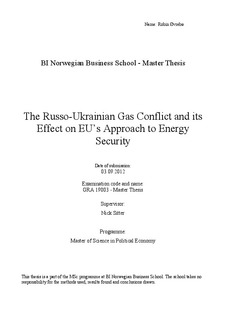| dc.description.abstract | The Russo-Ukrainian gas conflict was a prolonged dispute between Russia
Ukraine on issues in the gas relations between the two countries. This conflict has
caused several supply disruptions in the supplies to the EU. The supply disruption
of 2009 was the most in the history of the EU. The goal of this thesis has been to
analyze if this conflict, has caused a change in EU’s approach to energy security,
from an internal market perspective, to a security of supply perspective.
The focus of the existing literature is, to a great extent, independently on either
energy security, the conflict itself or EU’s energy policy. This thesis contributes
with an analysis of the effect of this particular conflict on EU’s approach to
energy security, through five causal mechanisms. These five mechanisms are;
“The New World of Oil”, the Eastern enlargement, the return of Russia on the
international scene, Gazprom’s goal of global domination and the changes in the
European utility industry. To analyze the effects, liberal intergovernmentalism has
been applied as the theoretical framework which has guided the analytical
process. Rather than to test the theory by this particular case, LI has been applied
to derive empirical implications for the use in the analysis. These implications, in
combination with the five mechanisms, have guided the analysis. The data has
been based on EU documents, documents published by national governments,
company reports, organizational reports, news articles and scholarly contributions
Based on the findings, the conclusion is that there was a change in approach
towards security if supply by the turn of the new millennium, as a consequence of
the changes in the world’s oil market. The Russo-Ukrainian gas conflict
reinforced this trend. Based on the findings, it seems that the conflict did not
happen in a vacuum, as s stand-alone event. Rather it may be seen as symptomatic
for the wider changes in the world’s energy markets. For some Member States, the
conflict was a wake-up call, as EU’s economic assumptions were challenged. For
others Member States, it reinforced latent geopolitical interests. Despite increased
focus on security of supply, the Member States preferences continue to diverge to
a considerable degree, because of different views on Russia, and because of
different interpretations of energy as a resource. This divergence continues to be a
hindrance towards a common energy policy. | no_NO |
